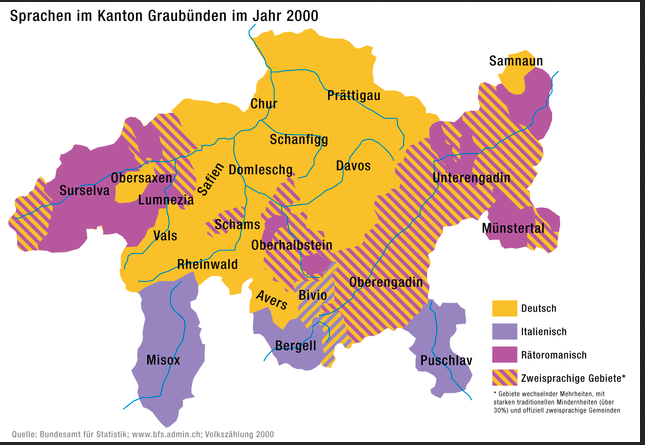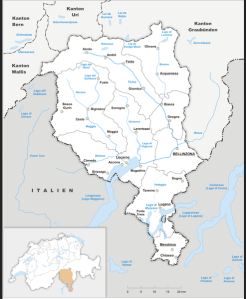Swiss Italian is the name given to the dialect spoken by about 500,000 Swiss in the canton of Ticino and in the southern part of Grisons (Canton Grigioni). Swiss Italian is also the term used to signify the Italian-speaking autochthonous population in Switzerland.
Italian in Ticino
Ticino is one of the 26 Swiss cantons and borders the canton of Uri in the north, Valais to the west and Grisons to the northeast. In the south it shares the border with Italy’s regions of Piedmont and Lombardy. Campione d’Italia is a small Italian exclave in Ticino on the Lago di Lugano (lake Lugano). This region is named after the Ticino river, the largest river in the canton.
(© Wikipedia: Tschubbi)
The Italian spoken in this part of Switzerland is very similar to the standard Italian. But aside from the intonation, there are several differences from the Italian spoken in Italy, due the assimilation of French and German words and expressions. The Canton Ticino is part of Switzerland since the XVI th century but Lugano and Bellinzona became officially the „canton Ticino“ that joined the Swiss Confederation as a full member only in 1803. German and French have highly influenced the language in this territory.
The Italian in Switzerland has for example many words ending in –zione where the Italian would have –mento: isolazione (Swiss Italian), isolamento (Italian). For a sale, Swiss Italian adopts the German word of action, whereas in Italy you would call it “offerta speciale” (special offer).
However, the influence from Swiss German and French can be noticed at several levels of the language. You can find Grazie per non fumare (“Thank you for not smoking”) a direct translation from the French Merci pour ne pas fumer or franchetto, where the –etto is used analogically to the –li (diminutive) of the Swiss German Fränkli („Swiss Frank“). If you book a table in a restaurant, you will use the word riservare and not prenotare like in Italy. If you are standing in a queue or line, you will say that you are in a colonna and not a coda (Italian). And if you order a coffee you would say comandare and not ordinare (Italian), following the French commander; chifer derives from the Swiss German Gipfeli (Italian: cornetto, French: croissant) and the change would be called ritorno, not resto like in Italian. Also, you would bring your car to a garage (like in French), whereas in Italy you would bring it to the concessionario.
There are also analogies with the North Italian varieties. For example mica is used for negation in sentences like Questo è mica vero („This is not true“; note the post-verbal position and the absence of „non“). There are also some words, known in the adjacent italian regions, like gabola for guaio (trouble).
Ticinese
The dialect spoken in Ticino is generally called Ticinese. It is the name for the dialects of Westen Lombard spoken in this region.
Compared to the Western Lombard varieties spoken in Italy, the Ticinese is more vital and has a significant number of young speakers and some radio and television programms are in Ticinese.
You can find some examples in these resources:
- The Centro di dialettologia e di etnografia, a cantonal research institution, publishes a dictionary and studies about the Ticinese varieties.
- The Lessico dialettale della Svizzera italiana is a famous dictionary.
- Here and here you can find a few audio samples of some italian dialects of Ticino and some examples of the variety of Luganese.
Italian and Swiss Italian in the Grisons
Italian is spoken also in another region of Switzerland, the Canton Grigioni, Grisons.
Grisons is the only canton of Switzerland with three official languages: German in the northwest (68%), Rumantsch in the Engadin and around Disentis/Mustér (15%), and Italian in the Italian Grisons (10%) with the remaining 7% speaking another language.

( © wikipedia, Marco Zanoli)
In the Grigione italiano, Western Lombard is spoken in the Valle Mesolcina, Calanca, Bregaglia and Poschiavo (and the village of Maloggia by Sankt Moritz, Pontresina and Bivio).
Here is an example of a poem translated in several Swiss dialects on this site, in Swiss Standard German (1) and in the dialect of Poschiavo (2):
| (1) Deutschschweizerisches StandarddeutschDer Hosensack meines Buben | ||||||
| Eine alte Käpslipistole, ein Portemonnaie, natürlich leer, ein Bleistift und ein Stücklein Kohle, ein Nastuch, das gern sauber wär. |
||||||
| Ein grün angegrautes Bröcklein Kandiszucker, ein Klee, vierblättrig und verblüht, ein Sackmesser und eine Handvoll Marmeln, ein Los, das sicher nicht gewinnt. |
||||||
| Zündhölzer und ein Nielenstengel, ein Billett für auf den Münsterturm, eine Lupe und eine kleine Mundharmonika, und zuunterst noch ein Regenwurm. |
||||||
| Was so ein Knopf – ‘s ist fast ein Wunder – nicht alles mit sich umherträgt: Einen Sack voll Gerümpel, Dreck und Plunder? Einen Sack voll Bubenseligkeit! |
||||||
| – Übertragen von © Rolf Oberhänsli, Luzern, Oktober 2008 | ||||||
(2) Pus-ciavín
|
Swiss Italian in Australia
Italian speaking Swiss and Italians setteled in Australia during the 1850s and 1860s in the area around Daylesford and Victoria. These Swiss settlers were from the canton Ticino and the southern part of Graubünden whereas the Italian settlers were mainly from the northern Italian Regions of Lombardy, Veneto, Emilia Romagna, Liguria and Piemonte.
Related articles
- The Swiss German (expatsincebirth.com)
- Multilingual Switzerland (expatsincebirth.com)
- SWISS highlights Canton Grisons customs and cuisine. (linkybird.com)
- The “Suisse romand” (expatsincebirth.com)
- Why “Switzerland”? (expatsincebirth.com)







Love the poem 🙂
LikeLike
I lived in Italy just across the border from Ticino, and worked in Ticino for a couple of years, We (Italians) always made a bit of fun of some of the ticinese expressions and choice of “old” words., but as you’ve researched, the language developed over the years and centuries with its own specific words and intonation.
LikeLike
I guess we were neighbours then?! How funny is that!! I grew up in Varese, and you? And I also remember very well how we used to make fun of some of the ticinese expressions and also about the intonation they have. It also seemed that they talk on a much slower pace. – But when I lived in Switzerland I started to appreciate the Ticinese and especially the Poschiavino. As I’ve studied some Italian dialects for years and actually speak a few of them, it wasn’t easy for me to write a not-too-scientific post here. 😉
LikeLike
near lago di Como, so I commuted every day (and lunchtime as well), into Chiasso, I was a “frontaliere”… Did that for a couple of years, then moved to London, where the world is much bigger!
LikeLike
Nice post. I’m very interested in multilingualism too, especially dialects. As an Italian-Australian, I was brought up with a regional dialect which we still speak here in Australia but when I go back to my birthplace (Trieste) only the older folks speak the dialect, with the younger ones speaking the general Italian. Intriguing – and sad. Also, 21 February was ‘International Mother Language Day’ a UNESCO event. My latest blogpost touched on this: http://ambradambra.wordpress.com/2013/02/24/mother-tongue-turns-to-thoughts-of-food/
LikeLike
Hi ambradambra, I’m really interested in the dialect from Trieste you still speak in Australia. Do you speak it “only” with your family or are there other people who know it?
LikeLike
Hi Ute – the only people who speak the Triestine dialect are the immigrants who came from Trieste to Australia between 1954 and 1961 and settled here (and are still alive!). Their children (my generation) would speak it too if they were brought up with it (although that wasn’t always the case, with some parents preferring to speak only English with their children, or in some cases, the general Italian). So, my guess is that currently in Sydney – where I live – there are probably less than 1,000 expats from Trieste who still speak that city’s dialect among themselves and at the two remaining social clubs. (During the migration period, there were approx 4-5,000). The next highest concentration of ex-Trieste residents are concentrated in Melbourne.
LikeLike
That’s very interesting! I would like to learn more about this. How are the two social clubs called? And are there clubs also in Melbourne? Thanks a lot. I just got inspired to write something about this (maybe with your help?).
LikeLike
Hi Ute, the two associations in Sydney are called: Associazione Giuliani Sydney Inc. and Famiglia Giuliana di Sydney. I’m not sure what the social club in Melbourne is called though. There are also some outside of Sydney/Melbourne as well as in Argentina, Brazil and the US. Cheers
LikeLike
Thanks a lot! I’ll see what else I can find out about them. Do you know one of those in Sydney? – I know, I’m too curious… but it would be great to have some insights of these associations by someone like you 😉
LikeLike
Hi – the social club that my parents belonged to is: Associazione Giuliani Sydney Inc. They are still active but with its membership ageing steadily I think they only have about 80-100 members now.
LikeLike
Thank you very much for this information! I also found a site with all the “Associazioni Italiane all’Estero”. Thanks a lot!
LikeLike
Thanks for the marvelous posting! I certainly enjoyed reading it, you can be a great author.I will remember to bookmark your blog and may come back very soon. I want to encourage one to continue your great job, have a nice evening!
LikeLike
Je suis entièrement d’accord avec toi
LikeLike